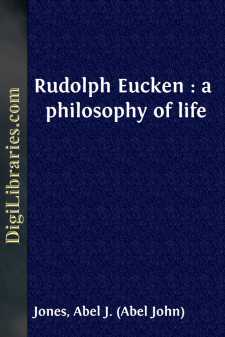Categories
- Antiques & Collectibles 13
- Architecture 36
- Art 48
- Bibles 22
- Biography & Autobiography 813
- Body, Mind & Spirit 142
- Business & Economics 28
- Children's Books 16
- Children's Fiction 13
- Computers 4
- Cooking 94
- Crafts & Hobbies 4
- Drama 346
- Education 46
- Family & Relationships 57
- Fiction 11829
- Games 19
- Gardening 17
- Health & Fitness 34
- History 1377
- House & Home 1
- Humor 147
- Juvenile Fiction 1873
- Juvenile Nonfiction 202
- Language Arts & Disciplines 88
- Law 16
- Literary Collections 686
- Literary Criticism 179
- Mathematics 13
- Medical 41
- Music 40
- Nature 179
- Non-Classifiable 1768
- Performing Arts 7
- Periodicals 1453
- Philosophy 64
- Photography 2
- Poetry 896
- Political Science 203
- Psychology 42
- Reference 154
- Religion 513
- Science 126
- Self-Help 84
- Social Science 81
- Sports & Recreation 34
- Study Aids 3
- Technology & Engineering 59
- Transportation 23
- Travel 463
- True Crime 29
Rudolph Eucken : a philosophy of life
Categories:
Description:
Excerpt
CHAPTER I
THE PROBLEM OF LIFE
Before we proceed to outline Eucken's philosophical position, it will be well if we can first be clear as to the special problem with which he concerns himself. Philosophers have at some time or other considered all the problems of heaven and earth to be within their province, especially the difficult problems for which a simple solution is impossible. Hence it is, perhaps, that philosophy has been in disrepute, especially in English-speaking countries, the study of the subject has been very largely limited to a small class of students, and the philosopher has been regarded as a dreamy, theorising, and unpractical individual.
Many people, when they hear of Eucken, will put him out of mind as an ordinary member of a body of cranks. From Eucken's point of view this is the most unfortunate thing that can happen, for his message is not directed to a limited number of advanced students of philosophy, but is meant for all thinking members of the human race.
The problem he endeavours to solve is far from being one of mere theoretical interest; on the contrary it has to do with matters of immediate practical concern to the life of the individual and of the community. To ignore him will be to fail to take account of one of the most rousing philosophies of modern times.
The apathy that exists in regard to the subject of philosophy is not easy to explain. It is not that philosophising is only possible to the greatest intellects; it is indeed natural for the normal mind to do so. In a quiet hour, when the world with its rush and din leaves us to ourselves and the universe, we begin to ask ourselves "Why" and "How," and then almost unconsciously we philosophise. Nothing is more natural to the human mind than to wonder, and to wonder is to begin to philosophise.
Perhaps philosophers have been largely to blame for the indifference shown; their terms have often been needlessly difficult, their language obscure, and their ideas abstruse. Too often, too, their abstract speculations have caused them to ignore or forget the actual experience of mankind.
Those who have quarrelled with philosophy for these or other reasons will do well to lay their prejudices aside when they start a study of Eucken, for though he has some of the faults of his class, he has many striking and exceptional excellences.
Philosophers in general set out to solve the riddle of the universe. They differ in their statement of the problem, in the purpose of the attempt, and in their methods of attempting the solution. Some will wonder how this marvellous universe ever came into existence, and will consider the question of the existence of things to be the problem of philosophy. Others in observing the diversity of things in the universe wonder what is behind it all; they seek to go beyond mere appearances, and to investigate the nature of that behind the appearances, which they call the reality. In their attempts to solve one or both of these problems, thinkers are led to marvel how it is that we get to know things at all; they are tempted to investigate the possibility of knowledge, and are in this way side-tracked from the main problem. Others in their investigations are struck with amazement at the intricate organisation of the human mind; they leave the riddle of the universe to study the processes of human thought, and examine as far as they are able the phenomena of consciousness. Then thought itself claims the attention of other philosophers; they seek to find what are the laws of valid thought, what rules must be followed in order that through reasoning we may arrive at correct conclusions. Others become attracted to an investigation of the good in the universe, and their question changes from "What is?" to "What ought to be?" Others interest themselves in the problem of the beautiful, and endeavour to determine the essence of the beautiful and of its appreciation. In this way the subject of philosophy separates out into a number of branches. The study of the beautiful is called Æsthetics; of the good, Ethics; of the laws of thought, Logic; of the mind processes, Psychology; of the possibility of knowledge, the Theory of knowledge; while the deeper problems of the existence of things, of reality and unity in the universe, are generally included under Metaphysics....


